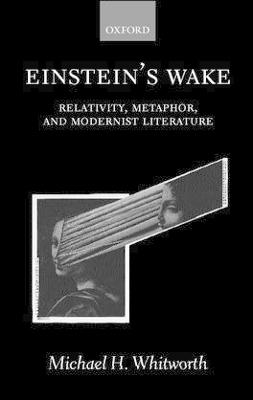
Einstein's Wake
Relativity, Metaphor, and Modernist Literature
Seiten
2001
Oxford University Press (Verlag)
978-0-19-818640-3 (ISBN)
Oxford University Press (Verlag)
978-0-19-818640-3 (ISBN)
Modernist writers were well aware of the new physics and its underlying concepts. Einstein's Wake shows how the most innovative scientific thinking was understood by non-specialists such as Joseph Conrad, Virginia Woolf, D. H. Lawrence, and T. S. Eliot, and how it entered into their literary works.
The revolution in literary form and aesthetic consciousness called modernism arose as the physical sciences were revising their most fundamental concepts: space, time, matter, and the concept of 'science' itself. The coincidence has often been remarked upon in general terms, but rarely considered in detail. Einstein's Wake argues that the interaction of modernism and the 'new physics' is best understood by reference to the metaphors which structured these developments. These metaphors, widely disseminated in the popular science writing of the period, provided a language with which modernist writers could articulate their responses to the experience of modernity. Beginning with influential aspects of nineteenth-century physics, Einstein's Wake qualifies the notion that Einstein alone was responsible for literary 'relativity'; it goes on to examine the fine detail of his legacy in literary appropriations of scientific metaphors, with particular attention to Virginia Woolf, D. H. Lawrence, Wyndham Lewis, and T. S. Eliot.
The revolution in literary form and aesthetic consciousness called modernism arose as the physical sciences were revising their most fundamental concepts: space, time, matter, and the concept of 'science' itself. The coincidence has often been remarked upon in general terms, but rarely considered in detail. Einstein's Wake argues that the interaction of modernism and the 'new physics' is best understood by reference to the metaphors which structured these developments. These metaphors, widely disseminated in the popular science writing of the period, provided a language with which modernist writers could articulate their responses to the experience of modernity. Beginning with influential aspects of nineteenth-century physics, Einstein's Wake qualifies the notion that Einstein alone was responsible for literary 'relativity'; it goes on to examine the fine detail of his legacy in literary appropriations of scientific metaphors, with particular attention to Virginia Woolf, D. H. Lawrence, Wyndham Lewis, and T. S. Eliot.
Michael H. Whitworth Lecturer in English, University of Wales, Bangor
INTRODUCTION ; 1. The Specialist, the Generalist, and the Popularist ; 2. Things Fall Apart: The Secret Agent and Literary Entropy ; 3. Descriptionism: Consuming Sensations ; 4. An Entente Cordiale? The New Relations of Literature and Science ; 5. Invisible Men and Fractured Atoms ; 6. Simultaneity: A Return Ticket to Waterloo ; 7. Non-Euclidean Humanity ; CONCLUSION ; SELECT BIBLIOGRAPHY ; INDEX
| Erscheint lt. Verlag | 1.1.2002 |
|---|---|
| Verlagsort | Oxford |
| Sprache | englisch |
| Maße | 146 x 225 mm |
| Gewicht | 424 g |
| Themenwelt | Geisteswissenschaften ► Sprach- / Literaturwissenschaft ► Anglistik / Amerikanistik |
| Geisteswissenschaften ► Sprach- / Literaturwissenschaft ► Literaturwissenschaft | |
| Naturwissenschaften ► Physik / Astronomie ► Relativitätstheorie | |
| Sozialwissenschaften | |
| ISBN-10 | 0-19-818640-1 / 0198186401 |
| ISBN-13 | 978-0-19-818640-3 / 9780198186403 |
| Zustand | Neuware |
| Haben Sie eine Frage zum Produkt? |
Mehr entdecken
aus dem Bereich
aus dem Bereich
Poetik eines sozialen Urteils
Buch | Hardcover (2023)
De Gruyter (Verlag)
CHF 83,90
Buch | Softcover (2024)
belleville (Verlag)
CHF 27,95


